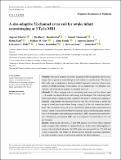A size‐adaptive 32‐channel array coil for awake infant neuroimaging at 3 Tesla MRI
Author(s)
Ghotra, Anpreet; Kosakowski, Heather L; Takahashi, Atsushi; Etzel, Robin; May, Markus W; Scholz, Alina; Jansen, Andreas; Wald, Lawrence L; Kanwisher, Nancy; Saxe, Rebecca; Keil, Boris; ... Show more Show less
DownloadPublished version (1.584Mb)
Publisher with Creative Commons License
Publisher with Creative Commons License
Creative Commons Attribution
Terms of use
Metadata
Show full item recordAbstract
PURPOSE: Functional magnetic resonance imaging (fMRI) during infancy poses challenges due to practical, methodological, and analytical considerations. The aim of this study was to implement a hardware-related approach to increase subject compliance for fMRI involving awake infants. To accomplish this, we designed, constructed, and evaluated an adaptive 32-channel array coil. METHODS: To allow imaging with a close-fitting head array coil for infants aged 1-18 months, an adjustable head coil concept was developed. The coil setup facilitates a half-seated scanning position to improve the infant's overall scan compliance. Earmuff compartments are integrated directly into the coil housing to enable the usage of sound protection without losing a snug fit of the coil around the infant's head. The constructed array coil was evaluated from phantom data using bench-level metrics, signal-to-noise ratio (SNR) performances, and accelerated imaging capabilities for both in-plane and simultaneous multislice (SMS) reconstruction methodologies. Furthermore, preliminary fMRI data were acquired to evaluate the in vivo coil performance. RESULTS: Phantom data showed a 2.7-fold SNR increase on average when compared with a commercially available 32-channel head coil. At the center and periphery regions of the infant head phantom, the SNR gains were measured to be 1.25-fold and 3-fold, respectively. The infant coil further showed favorable encoding capabilities for undersampled k-space reconstruction methods and SMS techniques. CONCLUSIONS: An infant-friendly head coil array was developed to improve sensitivity, spatial resolution, accelerated encoding, motion insensitivity, and subject tolerance in pediatric MRI. The adaptive 32-channel array coil is well-suited for fMRI acquisitions in awake infants.
Date issued
2021Department
Massachusetts Institute of Technology. Department of Brain and Cognitive SciencesJournal
Magnetic Resonance in Medicine
Publisher
Wiley
Citation
Ghotra, Anpreet, Kosakowski, Heather L, Takahashi, Atsushi, Etzel, Robin, May, Markus W et al. 2021. "A size‐adaptive 32‐channel array coil for awake infant neuroimaging at 3 Tesla MRI." Magnetic Resonance in Medicine, 86 (3).
Version: Final published version